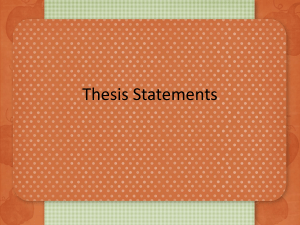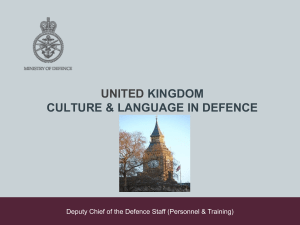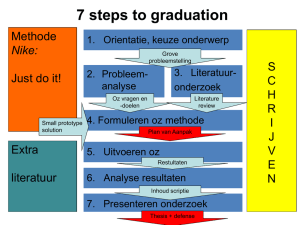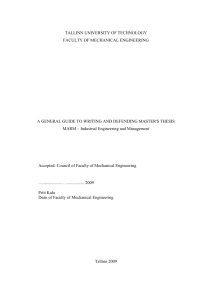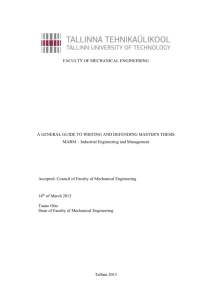Formal rules and general advice on the - CBS e
advertisement
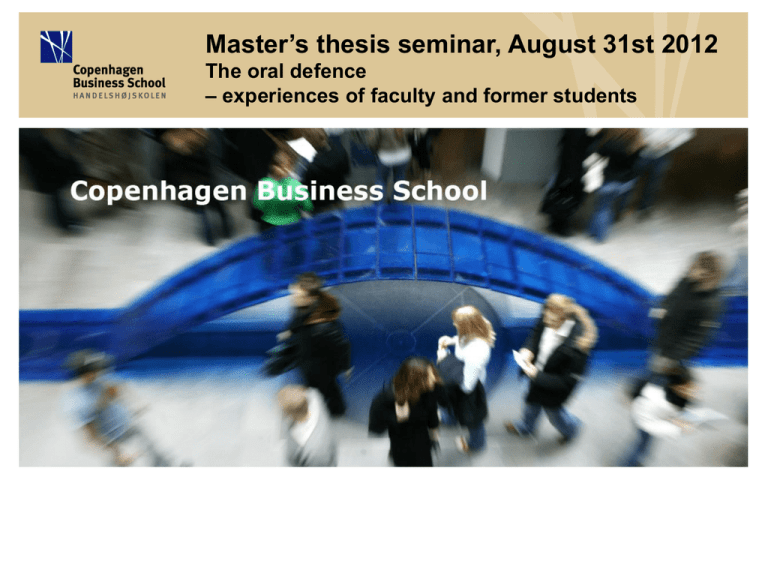
Master’s thesis seminar, August 31st 2012 The oral defence – experiences of faculty and former students Guidelines for the oral defence The Master’s thesis must be defended at an oral defence. The oral defence will always be individual, i.e. that even though the master's thesis has been written by two students together, the two students must each defend the thesis. The individual oral defence will last approximately 45 min. per student plus 10 min. for determining the grade (Please make sure you know the exact rules at your programme). The student’s supervisor and an external examiner will be present at the oral defence. The purpose of the oral defence is: - partly to make sure that the student participating in the exam is in fact the one (s), who have written the thesis partly to elaborate on and to discuss in a broader context the areas which the assessors find interesting. to celebrate the end of your studies The oral defence is held as a discussion between the student, the examiner and the external examiner. These discussions serve to clarify: - the intensions underlying the thesis and - to elaborate on the student’s choices and decisions during the process. It is not a traditional examination in syllabus Finally is the purpose of the oral defence, to give the student an evaluation and reason for the grade. The oral defence will proceed as follows: 1. The student will start off with a presentation of one or more key issues of the thesis. 2. Subsequently, a discussion of the thesis and the presentation of key issues will take place, directed by questions from the examiner and possibly the external examiner. 3. The student will then leave the examination room and the examiners will make their assessment . 4. The student will receive his/her grade and the reason for it. 5. The assessment of the Master’s thesis consists of an overall evaluation (that is a complete assessment) of the written master's thesis and the oral defence. The evaluation of the master's thesis consists of the following elements: • • • The master’s thesis (exclusive of enclosures and appendices) The executive summary (both content as well as spelling and expressive abilities) The oral defence The assessment of the master's thesis and the executive summary includes both the academic content as well as the spelling and writing skills. However, the academic content are emphasized the most. Regarding the criteria underlying the assessment of the master’s thesis, reference is made to the learning objectives and exam regulations written in your programme regulations. For master's theses written by two students the assessment will be carried out individually, so grade differentiation between the two students may occur. The presentation – what to include? There is not just one way of doing it – ask yourself what you prefer to talk about. Examples of things talk about: • Inconsistencies, flaws and shortcomings • Expand on issues in depth • Expand on issues in their broader context • New angles • Issues that you delimited yourself from early on • Issues you have researched, but not included in the thesis • But don’t go out on a limb, thougt. What you say should still be relevant to your topic. How to prepare for the oral defence • • • • • Start working on your presentation in ample time before the defence. Make a plan for what you would like to say during the presentation. Create written materials like keywords, mindmaps, PowerPoints, a commended agenda - make them although you have no intention of using them! Rehearse your presentation - speak out loud, time yourself, imagine the situation. Rehearse in front of an audience and ask for their feedback. Decide if you would like an audience at the real defence. The presentation • • • Present your agenda in headlines so your assessors will not interrup you for someting that will come later. Give your presentation in a manner that you feel comfortable with – Use black/white board, PowerPoint, hand-outs, but remember that you are 3 people in the room so choose tools that fits the situation. If you need electronic equipment, you need to speak with the programme administration in advance. Print PowerPoint slides and other illustrations in 3 copies, so your assessors can look at them during both presentation, discussion and grading. The discussion • The defence is a discussion between almost peers on an academic topic that everyone in the room finds interesting. • So do not restrict yourself to answer questions and defending and explaining your choices. • Enter into the discussion. You are the one knowing most about your topic – and it is not a bad thing to be self-critical academically speaking. • You supervisor chairs the discussion. Some external examiners participate in the discussion, some do not. The oral feedback • It is not easy to concentrate when you get your feed-back – but try anyway. • Ask questions and ask for details and clarifications if necessary. • Take notes – later on it can be difficult to remember what they said. Good luck with your oral defence!






